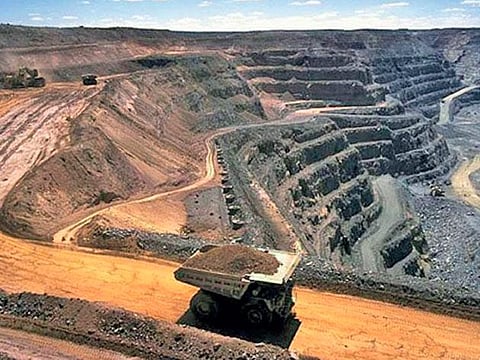

Less than seven months before the Goa Assembly elections in February 2022, the Bharatiya Janata Party (BJP)-led state government has paved the way for the formation of a state-owned mineral development corporation which will have the right to grant mining leases to any entity.
The Goa Mineral Development Corporation Bill, 2021, was passed amidst an Opposition walkout on July 31. The Pramod Sawant government passed the Bill following a July order of the Supreme Court that had dismissed the review petitions of the Goa government and Vedanta Limited against its February 2018 order that had ruled against the state's decision to renew 88 mining leases.
The Bill doesn't bar miners whose leases were cancelled by the SC for illegal iron ore mining from bidding. "The Corporation shall be entitled to enter into any contracts, agreements, memorandum of understandings, etc. for engaging entities for the purpose of carrying out mining operations as it may consider necessary or expedient or any other business connected therewith in accordance with this Act," according to Section 15 (4) of the Bill.
"There is no clause to prevent the corporation from awarding contracts to the very same miners whose leases had been cancelled by the Supreme Court after being identified by the Justice MB Shah Commission of Enquiry for carrying out large-scale illegal iron ore mining in Goa," Rebbapragada Ravi, chairperson of mines, minerals & PEOPLE (mm&P), an alliance of individuals, institutions and communities affected by mining, told Newsclick.
The Goa government has decided to restart mining despite the ecological damage caused by unscientific mining practices and not recovering Rs 35,000 crore quantified by the Shah Commission as the total extraction of illegal plundering of the resources.
A week before the Bill was passed, the Goa cabinet unanimously approved it in a meeting held on July 22. The Bill was formulated more than three years after the apex court nullified the 88 iron ore mining leases, which had been renewed by the Goa government in violation of an earlier SC order that directed granting of fresh leases.
In the February 2018 order, the top had court observed: "Obviously, the grant of a fresh lease is not the same as the renewal of a lease and when the Court in Goa Foundation required the state of Goa to grant a fresh lease, it did not require the state to renew the existing (expired) lease … decision of the state of Goa to grant a second renewal of the mining leases is erroneous, contrary to the decision in Goa Foundation and must be and is quashed."
However, the Goa government never invited bids for fresh leases for more than three years; instead, it decided to float a state-owned corporation to resume mining.
"What is the logic behind forming a mineral development corporation in Goa after so many years? Without due diligence in handing over mining contracts, it will only lead to undermining established practices of oversight and monitoring," Ravi said.
Rahul Basu of Goa Foundation feels that it should not be difficult for the Goa government to keep illegal miners out of the fray. "This can be achieved by introducing a simple clause in the bid eligibility conditions specifying that those accused of illegal mining in the past will not be allowed to participate in auction or tender to obtain contracts," Basu told Newsclick.
An email sent to the Goa government asking whether it intends to bar companies accused of illegal iron ore mining from participating in auctioning of contracts was not answered till the filing of this report.
The BJP's record in keeping out unscrupulous mining firms from bidding is not good, according to a study. An analysis of the credentials of firms who had applied for coal blocks after the sector was opened to private players by the Narendra Modi government in June 2020 reveals that none of the bidders were eligible to qualify given their past records of violation. The study was conducted jointly by Mineral Inheritors Rights Association, a coalition of civil society groups, and Delhi-based NGO Environics Trust.
Besides, locals affected by mining in Goa as well as activists and organisations fighting for their rights are unlikely to have any say in awarding of contracts. The corporation's Board, which will be headed by the chief minister, will neither have an independent member nor any representative of local communities affected by mining. Though the Board will be free to appoint consultants and advisers who can also attend its meetings, they will have no voting rights.
The apprehension that the Goa government will retain all mineral rights with itself after the formation of the corporation is not without basis.
In a meeting held in New Delhi in November 2020, Sawant met Union Home Minister Amit Shah, Union coal and mines minister Pralhad Joshi along with representatives of companies who had to cease mining following the SC order apparently to discuss the modalities for restarting mining in the state. The meeting was followed by hectic activity in Goa to formulate the Bill, according to sources.
In July, shortly before the Bill was introduced, Sawant met Joshi in New Delhi again and a memorandum of understanding was signed by the Goa government with the Mineral Exploration Corporation Limited for assessing the quantity of mineral deposits in the state. Assessment of mineral deposits is necessary for the state government to vest exclusive rights over Goa's underground natural resources with the corporation.
A provision to vest mineral rights with a state-owned corporation by keeping private players out, without inviting open bids for auction of leases, had earlier been put in place by the Modi government.
A state government can, with the concurrence of the Centre, unilaterally vest mineral rights with a public sector unit in accordance with the mining reforms undertaken by the Modi government by amending the Mines and Minerals (Development & Regulation) Act, 1957—popularly known as the MMDR Act—in 2015.
First published by Newsclick.